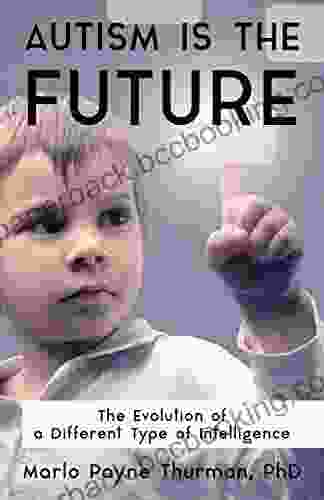The Evolution of Different Types of Intelligence: Exploring the Spectrum of Human Abilities

Intelligence is a multifaceted concept that has intrigued philosophers, psychologists, and scientists for centuries. While there is no single definition of intelligence, it is generally understood as the ability to learn, reason, solve problems, and adapt to new situations. Traditionally, intelligence has been measured using IQ tests, which focus on cognitive abilities such as verbal comprehension, mathematical reasoning, and spatial visualization.
4 out of 5
| Language | : | English |
| File size | : | 10651 KB |
| Text-to-Speech | : | Enabled |
| Screen Reader | : | Supported |
| Enhanced typesetting | : | Enabled |
| Word Wise | : | Enabled |
| Print length | : | 234 pages |
However, research in recent decades has revealed that intelligence is not a unitary construct. Rather, there are multiple types of intelligence, each with its own unique strengths and weaknesses. In his groundbreaking theory of multiple intelligences, Howard Gardner proposed eight distinct types of intelligence:
- Linguistic intelligence: the ability to use language effectively for communication, writing, and learning.
- Logical-mathematical intelligence: the ability to reason logically, solve problems, and understand mathematical concepts.
- Spatial intelligence: the ability to perceive and manipulate spatial relationships, visualize objects, and create mental images.
- Bodily-kinesthetic intelligence: the ability to use one's body effectively for physical activities, sports, and dance.
- Musical intelligence: the ability to create, perform, and appreciate music.
- Interpersonal intelligence: the ability to understand and interact effectively with others, build relationships, and resolve conflicts.
- Intrapersonal intelligence: the ability to understand one's own emotions, motivations, and strengths and weaknesses.
- Naturalistic intelligence: the ability to understand and interact with the natural world, including plants, animals, and ecosystems.
Gardner's theory has been influential in broadening our understanding of intelligence and recognizing the value of diverse cognitive strengths. Other researchers have proposed additional types of intelligence, such as:
- Emotional intelligence: the ability to understand, manage, and express one's own emotions, as well as the emotions of others.
- Social intelligence: the ability to interact effectively with others in social situations, build relationships, and navigate social norms.
- Practical intelligence: the ability to apply knowledge and skills to solve real-world problems and adapt to changing circumstances.
- Cultural intelligence: the ability to understand and interact effectively with people from different cultures, appreciate cultural diversity, and adapt to different cultural contexts.
Research on the evolution of intelligence suggests that different types of intelligence have evolved to meet the specific challenges and demands of different environments. For example, spatial intelligence may have been particularly important for early humans who needed to navigate through complex environments and hunt for food. Linguistic intelligence may have evolved as humans developed language as a means of communication and social interaction. And emotional intelligence may have been crucial for humans to cooperate and form social bonds.
The evolution of intelligence is a complex and ongoing process. As humans continue to face new challenges and opportunities, it is likely that new types of intelligence will emerge to meet these demands. By understanding the different types of intelligence and how they have evolved, we can better appreciate the diversity of human abilities and foster a more inclusive and equitable society.
Factors that Shape Intelligence
The evolution of different types of intelligence is influenced by a variety of biological, cognitive, and cultural factors. These factors include:
- Genetics: Genes play a role in shaping our cognitive abilities. However, intelligence is not simply inherited. Rather, genes interact with environmental factors to influence intelligence.
- Brain structure and function: The structure and function of the brain, particularly the prefrontal cortex, is associated with intelligence. Factors such as brain size, neural connectivity, and neurotransmitter levels can affect cognitive abilities.
- Environment: Environmental factors, such as early childhood experiences, education, and cultural influences, can have a significant impact on intelligence. Positive environmental experiences can promote cognitive development, while negative experiences can hinder it.
- Culture: Culture plays a role in shaping our values, beliefs, and attitudes about intelligence. Different cultures emphasize different types of intelligence, and this can influence how individuals develop and use their cognitive abilities.
Implications for Education and Society
The recognition of multiple types of intelligence has important implications for education and society. Traditional educational systems often focus on linguistic and logical-mathematical intelligence, which can disadvantage students who have strengths in other areas. By recognizing and valuing a wider range of cognitive abilities, educators can create more inclusive and effective learning environments.
In society, the emphasis on a single type of intelligence, such as IQ, can lead to discrimination and inequality. By recognizing the diversity of human intelligence, we can create a more equitable society that values all individuals and their unique contributions.
The evolution of different types of intelligence is a testament to the diversity and adaptability of the human mind. By understanding the different types of intelligence, their biological, cognitive, and cultural foundations, and their implications for education and society, we can better appreciate the richness of human cognition and create a more inclusive and equitable world.
4 out of 5
| Language | : | English |
| File size | : | 10651 KB |
| Text-to-Speech | : | Enabled |
| Screen Reader | : | Supported |
| Enhanced typesetting | : | Enabled |
| Word Wise | : | Enabled |
| Print length | : | 234 pages |
Do you want to contribute by writing guest posts on this blog?
Please contact us and send us a resume of previous articles that you have written.
 Book
Book Novel
Novel Page
Page Chapter
Chapter Text
Text Story
Story Genre
Genre Reader
Reader Library
Library Paperback
Paperback E-book
E-book Magazine
Magazine Newspaper
Newspaper Paragraph
Paragraph Sentence
Sentence Bookmark
Bookmark Shelf
Shelf Glossary
Glossary Bibliography
Bibliography Foreword
Foreword Preface
Preface Synopsis
Synopsis Annotation
Annotation Footnote
Footnote Manuscript
Manuscript Scroll
Scroll Codex
Codex Tome
Tome Bestseller
Bestseller Classics
Classics Library card
Library card Narrative
Narrative Biography
Biography Autobiography
Autobiography Memoir
Memoir Reference
Reference Encyclopedia
Encyclopedia Tim Rappleye
Tim Rappleye Wolfgang Streeck
Wolfgang Streeck Rick Rodgers
Rick Rodgers Sasha Su Ling Welland
Sasha Su Ling Welland Salman Rashid
Salman Rashid Mike Monteiro
Mike Monteiro Robert Coles
Robert Coles Rashers Tierney
Rashers Tierney Sam Hampton Smith
Sam Hampton Smith Tom Burton
Tom Burton Marcia Langton
Marcia Langton Morris Ardoin
Morris Ardoin Richard Platt
Richard Platt Melissa Coleman
Melissa Coleman Thomas Perry
Thomas Perry Philip Slayton
Philip Slayton Tim Dowley
Tim Dowley Matthew Dixon
Matthew Dixon Paul Czajak
Paul Czajak Muon Thi Van
Muon Thi Van
Light bulbAdvertise smarter! Our strategic ad space ensures maximum exposure. Reserve your spot today!

 Harrison BlairUnlock Culinary Magic with the Copycat Recipes Box Set: A Treasure Trove of...
Harrison BlairUnlock Culinary Magic with the Copycat Recipes Box Set: A Treasure Trove of...
 Brody PowellUnlock Your Artistic Potential with "Learn To Paint In Acrylics With 50 More...
Brody PowellUnlock Your Artistic Potential with "Learn To Paint In Acrylics With 50 More... Emanuel BellCivil Rights Icon: The Life and Legacy of Civil Rights Leader And Longtime...
Emanuel BellCivil Rights Icon: The Life and Legacy of Civil Rights Leader And Longtime... Richard WrightFollow ·8.8k
Richard WrightFollow ·8.8k Frank MitchellFollow ·15.8k
Frank MitchellFollow ·15.8k Arthur Conan DoyleFollow ·13k
Arthur Conan DoyleFollow ·13k Forrest ReedFollow ·13.9k
Forrest ReedFollow ·13.9k Robert ReedFollow ·12.5k
Robert ReedFollow ·12.5k Houston PowellFollow ·10.2k
Houston PowellFollow ·10.2k Edgar CoxFollow ·7.2k
Edgar CoxFollow ·7.2k Bob CooperFollow ·14.7k
Bob CooperFollow ·14.7k

 E.M. Forster
E.M. ForsterBluewater Walkabout: Into the Pacific
An Unforgettable...

 Joseph Foster
Joseph FosterUnlock the Secrets of Standardized Test Success with Test...
Are you tired of struggling with standardized...

 Joe Simmons
Joe SimmonsUnlock Learning with Flash Cards for Kindergarten:...
Ignite a Passion for...

 Raymond Parker
Raymond ParkerJourney into the Enchanting World of "The Heart Kingdom"...
A Timeless Tale of Love,...
4 out of 5
| Language | : | English |
| File size | : | 10651 KB |
| Text-to-Speech | : | Enabled |
| Screen Reader | : | Supported |
| Enhanced typesetting | : | Enabled |
| Word Wise | : | Enabled |
| Print length | : | 234 pages |










